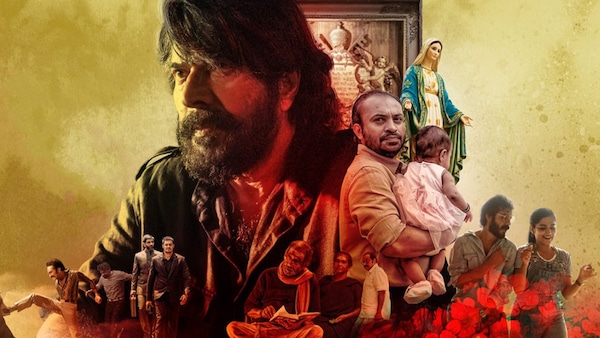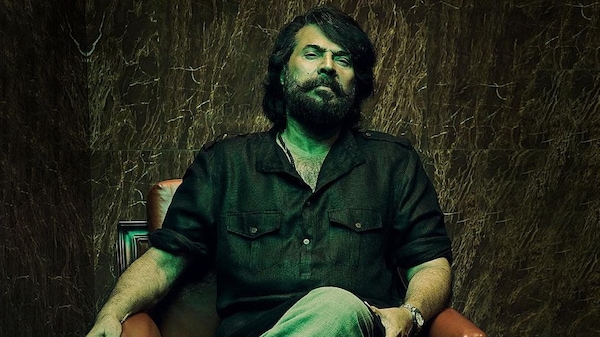Bheeshma Parvam movie review: Mammootty, Amal Neerad’s thriller trumps Big B in storytelling and performances
Director Amal Neerad doesn’t try anything new or experimental, he keeps it simple and follows the basic structure of screenplay with three acts – the set-up, the conflict and the solution - with the story that is inspired from The Godfather and Mahabharat. But this is done so masterfully, that it keeps you engaged

Last Updated: 09.39 PM, Mar 03, 2022
Story: Patriarch Michael rules his family with an iron hand. While he is the protector for the people in Kochi and a kingmaker of sorts who commands respect from those who seek his help, his family mostly fears him for his reputation. Michael has a soft heart for his eldest brother’s wife and children, which doesn’t go down well with the others in the family that also consists of two other brothers, two wayward nephews and a brother-in-law who makes his younger sister’s life a living hell. After Michael’s past catches up to him, his family is threatened by outsiders as well as those within; how he takes care of business forms the plot.
Review: The opening 20 minutes of Bheeshma Parvam almost spans the same way as Francis Ford Coppola’s The Godfather; the characters are all introduced as the family prepares for a birthday party. In the middle of this, Michael, the patriarch, listens intently to a grievance of a mother and her daughter-in-law, who has come to seek his help to exact revenge. Michael promises help and dispatches his aide Shivankutty to see this through. In between, Amal also expertly weaves in the tension between the family members – all the while never letting the pace and the build up slacken. By now, fans of Mario Puzo’s novel as well as the classic film, are so engrossed to see what the similarities are, but Amal instead pays a rich tribute to The Godfather and almost sets his film in a parallel universe where the characters and setting are familiar and yet so different. You would never expect Vito or Michael Corleone to give such powerful instructions but in a playful manner to his right-hand man. Therein lies Amal’s brilliance of shaping up a film that would resemble in parts Ram Gopal Varma’s Sarkar and Mani Ratnam’s Nayagan – all inspired by the same classic.
Amal here doesn’t try anything new or experimental, he keeps it simple and follows the basic structure of screenplay with three acts – the set-up, the conflict and the solution. But this is done so masterfully, that it keeps you engaged. This is no mean feat in a film with a plethora of characters connected through interpersonal relationships and yet the filmmaker has pulled it off, using almost every artiste to their best potential in moving the story forward.
The weight of expectations that comes with being the follow-up film of Amal and Mammootty after 2007’s Big B doesn’t seem to have bothered the filmmaker one bit, as he’s chosen a film that is far from the stylish action entertainer. Bheeshma Parvam, which is scripted by Amal and Devadath Shaji, is rooted in the sense that it is about family conflicts. And even the most powerful person can be stripped of all the authority when it comes to exercising judgments within his kith and kin. Mammootty’s excels in this part as Michael who much like Mahabharat’s Bheeshmacharya vows to prioritise his family. For the audience expecting slow-motion action scenes and punch dialogues, the filmmaker ensures they get their liberal dose too. And apart from a long action scene in the second half, that seems to have been shot keeping the pandemic restrictions in mind, they are impactful, and composer Sushin Shyam's electric music throughout the movie elevates these.
But it’s not just Mammootty, who is in top form thanks to the look and body language with which he carries off the role of Michael. While it’s the megastar and a stellar Shine Tom Chacko, who plays the toxic Peter to perfection, who shine in the first half, it’s Soubin Shahir who stand out in the latter. Sreenath and Soubin - who play brothers - portray varying emotions and ace their acts. In fact, for about 20 minutes in the second half, the movie doesn’t feature Michael at all but the script is so well paced and the performances so riveting that you hardly miss the screen presence of Mammootty in these portions. Sudev Nair too delivers probably his best performance in a commercial film till date as the antagonist Rajan Madhavan Nair, who is equal parts menacing and refined. The women characters are also treated with so much dignity, which is often lacking in superstar-driven films. It, however, would have added to the film if their characters got more screen time as compared to the plotters essayed by Dileesh Pothan, Jinu Joseph and Hareesh Uthaman.

Anend C Chandran’s cinematography is a treat, especially during the action sequences. The attention to detailing given to each frame stands out – be it in Shine Tom Chacko’s introduction where he is snorting coke in the corner of a room filled with elements that remind you of the 80s time period and also the vibrant colours, or the sequence in the open courtyard where Soubin and Michael’s nephews slug it out during a rainy day. It’s almost a nod to Amal’s sequence in Big B.
In a film filled with so many characters, Sushin’s music plays a pivotal role in itself – especially during the denouement and when Michael pronounces his judgment. Though the movie does overindulge itself in the family drama bit in the first half and also some of the dialogues do became inaudible because of the thumping music, Bheeshma Parvam still ranks among the top 2 in Amal’s filmography.
Verdict: Amal Neerad and Mammootty’s Bheeshma Parvam trumps Big B in terms of storytelling and performances. This masterfully crafted film is also rich tribute to Francis Ford Coppola’s The Godfather as well as the Indian versions such as Mani Ratnam’s Nayakan and Ram Gopal Varma’s Sarkar.
Subscribe to our newsletter for top content, delivered fast.

